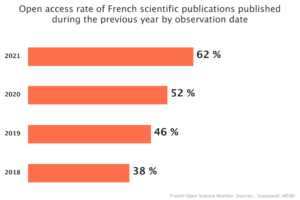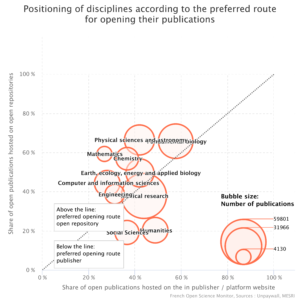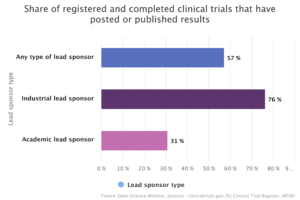The French Open Science Monitor has been given a makeover
The Ministry of Higher Education, Research and Innovation has launched a renewed and greatly enriched version of the French Open Science Monitor featuring a new section on health research. On this occasion, a ‘Flash Note‘ from the MESRI’s Sub-directorate for Information Systems and Statistical Studies (SIES) presented the results of the 2021 Monitor. These showed that 62% of the 166,000 French scientific publications published in 2020 were in open access in December 2021 which represented a 10-point increase in one year. 18% are in open access only via an open archive, 16% only via the publisher and 28% by both means together. Thus the complementary nature of the different ways of accessing articles has once again been confirmed.
The new generation French Open Science Monitor is based on a reinforced methodology based on using open, reliable and controlled data. It will now be updated every quarter of the year. It has been given a new interface and new data visualisations to improve the user experience and facilitate access to information.
Two versions of the Monitor are now available – a General Monitor offering numerous indicators on the openness of French scientific publications from all disciplines, and a Health Monitor focusing, as the name suggests, on health research. The latter Monitor is funded by the Ministry of Higher Education, Research and Innovation’s emergency COVID-19 budget and is part of an approach designed to promote open science practices in the context of the ongoing health crisis.
The analysis of open access scientific publications has been enhanced and more specifically new indicators hive information on the diversity of economic models for open access publishing with or without publication costs (APC) which researchers or their institutions have to pay. New graphs show how open access publications are constantly evolving, present the rate of open access by publisher or publication platform, specify the preferred ways of opening articles according to the publisher or discipline and give details of the most commonly used open archive platforms.
The Health Monitor, meanwhile, is based on all indicators relating to publications in the field of health research and also adds a focus on clinical trials and observational studies. It particularly provides numerous indicators on the registration of clinical trials and their results in public registers like ClinicalTrials.gov. Indeed, 57% of clinical trials completed in the last 10 years are reported to have publicly shared their results. The Monitor thus highlights this practice which is essential for the medical research to function efficiently since it avoids the duplication of trials and accelerates the dissemination of both positive and negative results thus helping to combat “publication bias” (when negative results are ignored because they are not included in scientific publications). It also increases transparency which in turn creates greater trust among the patients involved in such studies.
In addition, the numerous enriched features included in this new French Open Science Monitor can now be easily implemented by higher education and research establishments thanks to a methodology currently being tested at the Université de Lorraine, the Alternative Energies and Atomic Energy Commission (CEA) and other institutions.
Read the announcement of the Ministry of Higher Education, Research and Innovation








